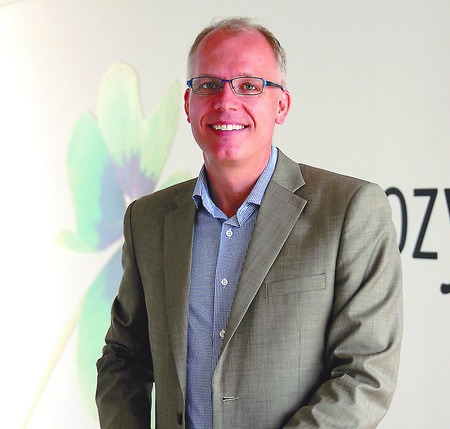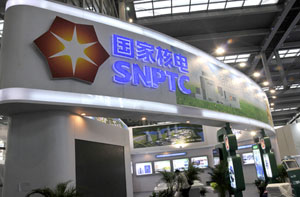Dancing to a different tune
Updated: 2011-09-29 10:11
By Du Juan (China Daily)
|
|||||||||||
|
 |
 |
President of Novozymes (China) sees bio-ethanol as future fuel
BEIJING - It's easy to mistake the tall, elegant figure of Michael Fredskov Christiansen for a professional dancer. Indeed, he did attend his mother's dancing school in his native Denmark. However, the stage he inhabits now is more down-to-earth.
The 43-year-old with a charming smile is president of Novozymes (China) Investment Co Ltd.
It's his firm conviction China will lead the bio-ethanol industry soon so his company is increasing its investment in the country.
Christiansen chose to join Novozymes, the biotech-based world leader in industrial enzymes and micro-organism production, in 1996 when he started his life in China. He said the most important decision he has made in Novozymes is to start the bio-ethanol project because "it is beneficial for China and the industry".
According to the United Nations and industry statistics, world ethanol production for transport fuel tripled between 2000 and 2007 from 17 billion to more than 52 billion liters. From 2007 to 2008, the share of ethanol in global gasoline-type fuel use increased from 3.7 percent to 5.4 percent. In 2010, worldwide ethanol fuel production reached 86.9 billion liters, with the United States as the top producer, accounting for 57.5 percent of global production.
Ethanol fuel is widely used in Brazil and in the US. Together both countries were responsible for 88 percent of the world's ethanol fuel production in 2010. Most cars on the road today in the US can run on blends of up to 10 percent ethanol, and the use of 10 percent ethanol gasoline is mandated in some US states and cities.
Bio-ethanol is a form of renewable energy that can be produced from agricultural feedstocks. It can be made from very common crops such as sugar cane, potato, manioc and corn. There has been considerable debate about how useful bio-ethanol will be in replacing gasoline. Concerns about its production and use relate to increased food prices due to the large amount of arable land required for crops as well as the energy and pollution balance of the whole cycle of ethanol production
The latest big move by Novozymes is to build the largest cellulosic ethanol factory in Heilongjiang province, cooperating with China Oil and Foodstuffs Corp Ltd (COFCO), China's largest oils and food importer and exporter, and China Petrochemical Corp (Sinopec Group), one of the major petroleum companies in the country.
The factory will start operations in the third quarter of the year with an annual production capacity of 10,000 tons of bio-ethanol.
COFCO has invested about 100 million yuan ($15.63 million) in the project over the past five years and Novozymes provides enzymes for it, said Yue Guojun, deputy assistant to the president of COFCO. He said Sinopec also spent about 40 million yuan on the project.
"The bio-ethanol industry is a good option for mankind and it is the right way to give us a green future," Christiansen said.
The cooperation among the three companies is aimed at exploring the commercialization of second-generation bio-ethanol production, which will cover the whole production chain of the fuel ethanol.
COFCO has been cooperating with Novozymes for three years. A demonstration factory with limited production capacity of ethanol has already been operating for two years.
Christiansen said the bio-ethanol fuel industry is particularly important for China because it can deal with the challenges of increasing energy demand in the country. Furthermore, given that transportation is a big pollution contributor in China, by using bio-ethanol fuel, waste emissions will be greatly reduced.
Related Stories
Novozymes: Biotech that helps fuel 'green' growth 2011-09-14 08:06
- China expands lending to fund-hungry small firms
- '9% GDP growth' for 2011
- Self-sufficiency in ore to pass 50%
- Citic Securities raises $1.7b in HK
- Foreign pilots call for better safety systems
- Crunch comes for those with underground loans
- Mayor sorry for demolition death
- Minimum wheat purchase prices raised for '12













